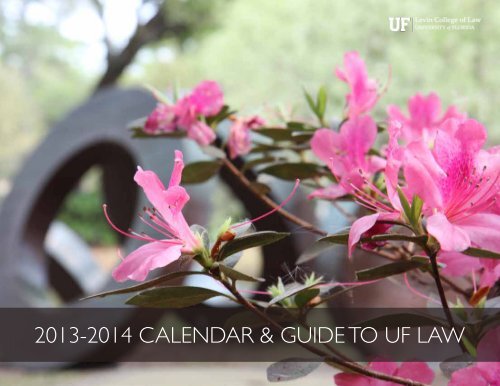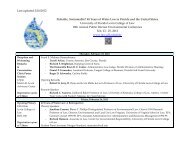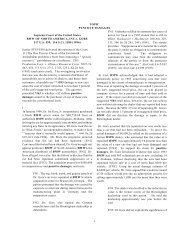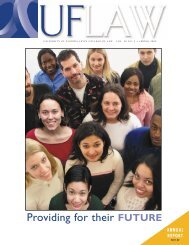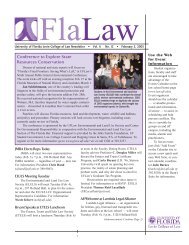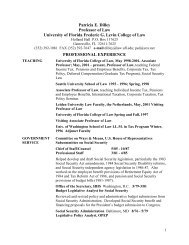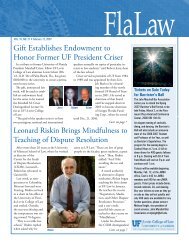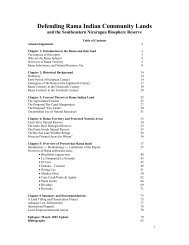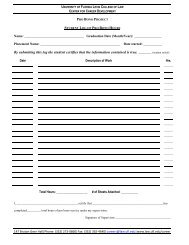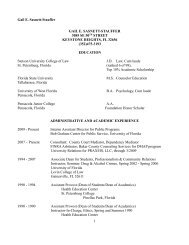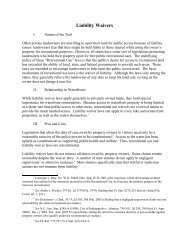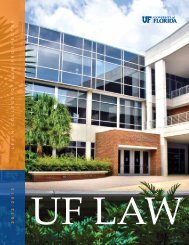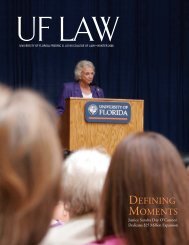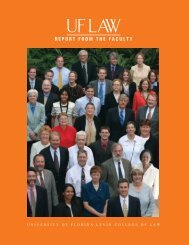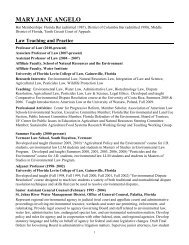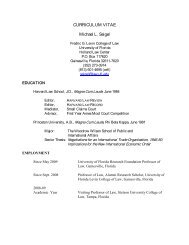2013-2014 Calendar & Guide to uF law - Levin College of Law ...
2013-2014 Calendar & Guide to uF law - Levin College of Law ...
2013-2014 Calendar & Guide to uF law - Levin College of Law ...
- No tags were found...
Create successful ePaper yourself
Turn your PDF publications into a flip-book with our unique Google optimized e-Paper software.
<strong>2013</strong>-<strong>2014</strong> <strong>Calendar</strong> & <strong>Guide</strong> <strong>to</strong> UF <strong>Law</strong>
UF <strong>Law</strong> is a comprehensive <strong>law</strong> school with a longstandingtradition <strong>of</strong> preparing graduates for significant leadershiproles and has leading programs in graduate taxation, family<strong>law</strong>, and environmental and land use <strong>law</strong>. UF <strong>Law</strong> also is one<strong>of</strong> the nation’s best values in legal education and boasts animpressive list <strong>of</strong> distinguished visi<strong>to</strong>rs <strong>to</strong> campus.A message fromDean Robert jerryAs the academic year begins, we welcomethe new and returning members <strong>of</strong> the UF<strong>Law</strong> Ga<strong>to</strong>r Nation — students in our J.D.,LL.M. and S.J.D. programs, and our facultyand staff. This promises <strong>to</strong> once again be anactive and exciting year on campus, and Ihope you are eager <strong>to</strong> get the <strong>2013</strong>-14 academicyear underway.For students new <strong>to</strong> UF <strong>Law</strong>, I expect youracademic experience <strong>to</strong> prepare you <strong>to</strong> benot only an effective legal practitioner butalso a better citizen and leader in your futureworkplace, your community and the legalpr<strong>of</strong>ession. Make the most <strong>of</strong> your time here,not just in your academic pursuits, but bydeveloping strong relationships with yourfellow students and future colleagues. Ouralumni tell us they call on these relationships<strong>of</strong>ten throughout their careers, and greatrewards can be found by reaching beyondyour comfort zone <strong>to</strong> develop friendships withclassmates very different than you. Our facultyand every student accepted here have records<strong>of</strong> extraordinary accomplishment, and we canall learn much from one another.I hope you find this <strong>Calendar</strong> & <strong>Guide</strong> <strong>to</strong> UF<strong>Law</strong> <strong>to</strong> be useful. Please visit our website atwww.<strong>law</strong>.ufl.edu and carefully read the University<strong>of</strong> Florida Student Honor Code. Academichonesty and integrity are fundamental values<strong>of</strong> the UF <strong>Law</strong> community, and students whoenroll at UF commit <strong>to</strong> holding themselvesand their peers <strong>to</strong> the highest standard <strong>of</strong>honor required by this code.Also, our website contains important policiesand guidelines <strong>to</strong> which students andother members <strong>of</strong> our community are expected<strong>to</strong> adhere. You are preparing <strong>to</strong> becomea part <strong>of</strong> a noble pr<strong>of</strong>ession; this means yourpr<strong>of</strong>essional reputation and legal career beginhere, and it is vital that you act accordingly.Our website also <strong>of</strong>fers details and updatedinformation on support services, financialinformation, student organizations, centersand institutes, course descriptions, faculty andstaff, maps and other helpful resources. Andeach week class is in session, be sure <strong>to</strong> readFla<strong>Law</strong> Online sent <strong>to</strong> your email or linkedfrom the www.<strong>law</strong>.ufl.edu home page <strong>to</strong> keepup with the many activities and events at the<strong>law</strong> school, including important informationabout career development and student services,alumni activities and more.It is great <strong>to</strong> be a Florida Ga<strong>to</strong>r. Welcome<strong>to</strong> the <strong>Levin</strong> <strong>College</strong> <strong>of</strong> <strong>Law</strong>.— Dean Robert Jerry
Academic <strong>Calendar</strong><strong>2013</strong> Fall SemesterAug. 13-16 “Introduction <strong>to</strong> <strong>Law</strong> School & the Pr<strong>of</strong>ession” for Fall <strong>2013</strong> classAug. 19-23 Drop/Add using ISIS (www.isis.ufl.edu)Aug. 19 Fall classes beginAug. 23 Class rolls fixed; fee liability attaches for studentsAug. 30 Tuition and fees due (3:30 p.m. at University Bursar)Sept. 2 Labor Day holiday; classes canceledSept. 3 Monday classes meet; Tuesday classes canceledSept. 13 Deadline <strong>to</strong> withdraw with 25% refund <strong>of</strong> course feesNov. 5-7 Advanced registration for spring termNov. 8 Homecoming; UF <strong>Law</strong> closedNov. 11 Veterans Day holiday, classes canceledNov. 25 Last day <strong>to</strong> drop course by petition without failing gradeNov. 26 Last day <strong>of</strong> classesNov. 27-29 Thanksgiving holiday; classes canceled, administrative <strong>of</strong>fices open Wed.Nov. 30 Reading period beginsDec. 4 Reading period endsDec. 5 Final exam period beginsDec. 18 Final exam period endsDec. 19 Graduation<strong>2014</strong> Spring SemesterJan. 6-10 Drop/Add using ISIS (www.isis.ufl.edu)Jan. 6 Spring classes beginJan. 10 Class rolls fixed; fee liability attaches for studentsJan. 17 Tuition and fees due (3:30 p.m. at University Bursar)Jan. 20 Martin Luther King Jr. Day holiday, classes canceledJan. 31 Deadline <strong>to</strong> withdraw with 25% refund <strong>of</strong> course feesMarch 3-7 Spring Break; classes canceledApril 1-3 Advance registration for summer and fall <strong>2014</strong> termsApril 11 Last day <strong>to</strong> drop course by petition without failing gradeApril 21 Last day <strong>of</strong> classesApril 22 Reading period beginsApril 24 Reading period endsApril 25 Final exam period beginsMay 8 Final exam period endsMay 16 Graduation, O’Connell Center at 2 p.m.<strong>2014</strong> Summer TermMay 18-20 Drop/Add using ISIS (www.isis.ufl.edu)May 19 Summer classes beginMay 20 Class rolls fixed; fee liability attaches for studentsMay 26 Memorial Day holiday, classes canceledMay 30 Tuition and fees due (3:30 p.m. at University Bursar)May 30 Deadline <strong>to</strong> withdraw with 25% refund <strong>of</strong> course feesJuly 4 Independence Day holiday; UF closedJuly 7 Last day <strong>to</strong> drop course by petition without failing gradeJuly 8 Last day <strong>of</strong> classesJuly 9 Reading period beginsJuly 13 Reading period endsJuly 14 Final exam period beginsJuly 18 Final exam period endsAug. 1 Graduation<strong>2014</strong> Fall SemesterAug. 12 “Introduction <strong>to</strong> <strong>Law</strong> School & the Pr<strong>of</strong>ession” beginsAug. 18 Fall classes beginNov. 25 Last day <strong>of</strong> classesNov. 29 Exam/reading period beginsDec. 17 Exam/reading period ends2015 spring SemesterJan. 5 Spring classes beginApril 20 Last day <strong>of</strong> classesApril 21 Exam/reading period beginsMay 7 Exam/reading period endsMay 15 Graduation2015 summer TermMay 18 Summer classes beginJuly 7 Last day <strong>of</strong> classesJuly 8 Exam/reading period beginsJuly 17 Exam/reading period ends*Dates subject <strong>to</strong> change. Contact Student Affairs for updates.
AugustSunday Monday Tuesday Wednesday Thursday Friday Saturday1234 5 6 7 8 9 1011 12 13 14 15 16 17First day <strong>of</strong> classesDrop/Add begins“Introduction <strong>to</strong> <strong>Law</strong> School& the Pr<strong>of</strong>ession” (ILSP)beginsOCI Early Interview WeekILSPILSP Community Service DaySoutheastern LegalPlacement Consortium(SELPC)Drop/Add endsClass rolls fixed; fee liabilityattaches for studentsMid-Atlantic Legal RecruitingConference (MALRC)18 19 20 21 22 23 24ILSPMultistate Pr<strong>of</strong>essionalResponsibility Exam (MPRE)Tuition and fees dueOCIUF v. Toledo2526272829 3031Pho<strong>to</strong> by UF <strong>Law</strong> Communications
SeptemberSunday Monday Tuesday Wednesday Thursday Friday SaturdayNo classesLabor DayMonday classes meet,Tuesday classes canceledRosh HashanahUF at Miami1 2 3 4 5 6 7OCIOCIMPRE application deadlinefor Nov. 2 examYom KippurDeadline <strong>to</strong> withdraw with25% refund <strong>of</strong> course fees8 9 10 11 12 13 14OCIOCIOCIUF v. Tennessee15 16 17 18 19 20 21First day <strong>of</strong> FallUF at Kentucky22 23 24 25 26 27 282930Pho<strong>to</strong> by UF <strong>Law</strong> Communications
Oc<strong>to</strong>berSunday Monday Tuesday Wednesday Thursday Friday SaturdayApplication deadline forSpring <strong>2014</strong> ExchangeProgramsOCIOCI1 2 3OCI4UF v. Arkansas5UF at LSU6 7 8 9 10 11 12Columbus DayUF at Missouri13 14 15 16 17 18 1920 21 22 23 24 25 26Halloween27 2829 3031Pho<strong>to</strong> by Chris Bastian, 2CLAS
NovemberSunday Monday Tuesday Wednesday Thursday Friday Saturday1UF v. Georgia (Jacksonville)Multistate Pr<strong>of</strong>essionalResponsibility Exam (MPRE)2Daylight Savings Time endsAdvance Registration forSpring <strong>2014</strong> (Nov. 5-7)OCI3 4 5 6 7 8 9OCINo classesUF HomecomingGa<strong>to</strong>r GrowlUF v. VanderbiltNo classesVeterans DayTimely filing deadline forFeb. <strong>2014</strong> Florida Bar ExamUF at South Carolina10 11 12 13 14 15 16UF v. Georgia Southern17 18 19 20 21 22 23Last day <strong>to</strong> drop course bypetition without failing gradeLast day <strong>of</strong> classesHanukkah begins Thanksgiving UF v. FSUReading period begins24 2526 27 28 2930Pho<strong>to</strong> by Chris Bastian, 2CLAS
DecemberSunday Monday Tuesday Wednesday Thursday Friday SaturdayReading period endsFinal exam period begins1 2 3 4 5 6 78 9 10 11 12 13 14Final exam period endsGraduationFirst day <strong>of</strong> Winter15 16 17 18 19 20 21Christmas DayKwanzaa begins22 23 24 25 26 27 28New Year’s Eve29 30 31Pho<strong>to</strong> by UF <strong>Law</strong> Communications
JanuarySunday Monday Tuesday Wednesday Thursday Friday SaturdayNew Year’s Day1 234Spring classes beginDrop/Add beginsDrop/Add endsClass rolls fixed; fee liabilityattaches for students5 6 7 8 9 10 11Tuition and fees due12 13 14 15 16 17 18No classesMartin Luther King Jr. Day19 20 21 22 23 24 25Deadline <strong>to</strong> withdraw with25% refund <strong>of</strong> course feesChinese New Year26 2728 293031Pho<strong>to</strong> by UF <strong>Law</strong> Communications
FebruarySunday Monday Tuesday Wednesday Thursday Friday Saturday1Groundhog Day2 3 4 5 6 7 8Spring OCI beginsValentine’s Day9 10 11 12 13 14 15Presidents Day16 17 18 19 20 21 22Florida Bar Exam in TampaFlorida Bar Exam in Tampa23 2425 262728Pho<strong>to</strong> by UF <strong>Law</strong> Communications
MarchSunday Monday Tuesday Wednesday Thursday Friday Saturday1No classesSpring Break (March 3-7)No classes No classes No classes No classes2 3 4 5 6 7 8Deadline for Fall <strong>2014</strong>Exchange Programs andSummer Study AbroadPrograms9 10 11 12 13 14 15Daylight Savings Time beginsSt. Patrick’s DayFirst day <strong>of</strong> Spring2316 17 18 19 20 21 222430 3125 26 27 28 29Pho<strong>to</strong>s courtesy <strong>of</strong> UF <strong>Law</strong> students: Eiffel Tower in Paris, France | Table Mountain in Cape Town, South Africa | Waterfall in San Jose, Costa Rica
AprilSunday Monday Tuesday Wednesday Thursday Friday SaturdayAdvance Registration forSummer and Fall terms(April 1-3)April Fools’ Day1 2 345Last day <strong>to</strong> drop coursesby petition without failinggrade6 7 8 9 10 11 12Palm SundayPassover beginsGood Friday13 14 15 16 17 18 19EasterLast day <strong>of</strong> classesReading period beginsEarth Day20 21 22 23 25 26Reading period ends24Exam period begins27282930Pho<strong>to</strong> by Chris Bastian, 2CLAS
MaySunday Monday Tuesday Wednesday Thursday Friday SaturdayTimely filing deadine forJuly <strong>2013</strong> Florida Bar Exam1 2 3Final Exam period ends4 5 6 7 8 9 10Mother’s DayGraduationArmed Forces DayDrop/Add begins11 12 13 14 15 16 17Summer classes beginDrop/Add endsClass rolls fixed; fee liabilityattaches for students18 19 20 21 22 23 24No classesMemorial DayTuition and fees dueDeadline <strong>to</strong> withdraw with25% refund <strong>of</strong> course fees25 2627 2829 3031Pho<strong>to</strong> by Blake L. Neumann/3L
JuneSunday Monday Tuesday Wednesday Thursday Friday Saturday1 2 3 4 5 6 7Flag Day8 9 10 11 12 13 14Father’s DayFirst day <strong>of</strong> Summer15 16 17 18 19 20 2122 23 24 25 26 27 282930Pho<strong>to</strong> by Jacob D. Moore/JD 12
JulySunday Monday Tuesday Wednesday Thursday Friday SaturdayIndependence Day1 2 345Last day <strong>to</strong> drop course bypetition withoutfailing gradeFriday classes meet,Tuesday classes canceledLast day <strong>of</strong> classesReading period begins6 7 8 9 10 11 12Reading period endsFinal exam period beginsFinal exam period ends13 14 15 16 17 18 1920 21 22 23 24 25 26Florida Bar Exam in TampaFlorida Bar Exam in Tampa27 2829 3031Pho<strong>to</strong> by UF <strong>Law</strong> Communications
Academic ProgramsJuris Doc<strong>to</strong>r CurriculumThe University <strong>of</strong> Florida <strong>College</strong> <strong>of</strong> <strong>Law</strong> was founded in 1909 and named in honor <strong>of</strong> alumnusFredric G. <strong>Levin</strong> in 1999. The college is accredited by the American Bar Association and is amember <strong>of</strong> the Association <strong>of</strong> American <strong>Law</strong> Schools. Its three-year Juris Doc<strong>to</strong>r (J.D.) curriculumcombines traditional and innovative teaching methods <strong>to</strong> develop analytical ability, practicalknowledge, communication skills and understanding <strong>of</strong> the legal pr<strong>of</strong>ession’s codes <strong>of</strong>ethics and pr<strong>of</strong>essional responsibility. This includes traditional “case” and “Socratic” methods,as well as problems, simulations and role-playing. Courses designed <strong>to</strong> develop and refinestudents’ writing abilities are required each year. Seminars and advanced courses provide closeinteraction and individualized research. Clinical programs allow students <strong>to</strong> develop skills inthe context <strong>of</strong> real cases and problems.The first-year curriculum consists <strong>of</strong> required courses and teaches students <strong>to</strong> read andanalyze cases, research points <strong>of</strong> <strong>law</strong> efficiently and express those points clearly. Second- andthird-year students choose from more than 100 elective courses and seminars.Degree RequirementsDegree requirements as stated in the <strong>Calendar</strong> & <strong>Guide</strong> <strong>to</strong> UF <strong>Law</strong> are in effect at the time <strong>of</strong>enrollment. Current requirements are:• Completion with a passing grade <strong>of</strong> courses <strong>to</strong>taling at least 88 semester credit hours, <strong>of</strong>which at least 59 must have been completed through the <strong>College</strong> <strong>of</strong> <strong>Law</strong>. No more thanfour <strong>of</strong> those credits can be earned through co-curricular activities. With permission <strong>of</strong> theassociate dean for students, upon good cause shown, up <strong>to</strong> 29 semester hours <strong>of</strong> creditearned at another ABA-accredited <strong>law</strong> school may be counted <strong>to</strong>ward this requirement.(Note: Grades in transferred courses will not be figured in<strong>to</strong> the student’s GPA.)• Completion with a passing grade in Legal Research (LAW 5803), Legal Writing (LAW 5792)and Appellate Advocacy (LAW 5793).• Completion with a passing grade <strong>of</strong> Introduction <strong>to</strong> <strong>Law</strong>yering (LAW 5755) and Legal Drafting(LAW 6955).• Completion with a passing grade in Pr<strong>of</strong>essional Responsibility (LAW 6750), in the secondyear.• Achievement <strong>of</strong> a cumulative GPA 2.0 on all graded work attempted.• Fulfillment <strong>of</strong> prescribed course requirements.• Satisfaction <strong>of</strong> the advanced writing requirement.These requirements must be fulfilled in no fewer than 24 months nor more than 84 months <strong>of</strong>matriculation as a <strong>law</strong> student.Course SelectionThe curriculum for beginning students is prescribed by the faculty, and must be completedprior <strong>to</strong> registration for elective courses. Students are required <strong>to</strong> take Legal Drafting in theirsecond year <strong>of</strong> study. Students may choose elective courses from any area, subject only <strong>to</strong>prerequisites. It is recommended that students select a variety <strong>of</strong> courses (see http://www.<strong>law</strong>.ufl.edu/academics/degree-programs/juris-doc<strong>to</strong>r/course-descriptions for courses and descriptions)<strong>to</strong> ensure broad exposure <strong>to</strong> diverse legal fields. Course schedules and curriculuminformation are available on the Student Affairs website.Advanced Writing RequirementAll J.D. candidates must produce — under close faculty supervision — a major, written, finishedproduct that shows evidence <strong>of</strong> original systematic scholarship based on individual research.Typically, students satisfy this requirement in the seminar course, however the requirement mayalso be met through the completion <strong>of</strong> an approved advanced course, an independent researchadvancedwriting requirement course, an approved master’s thesis or doc<strong>to</strong>ral dissertationcertified by a <strong>College</strong> <strong>of</strong> <strong>Law</strong> faculty member or through a note accepted for publication in aco-curricular <strong>law</strong> school journal as certified by the faculty adviser for the journal. If fulfilled in anadvanced course, the required writing may take the form <strong>of</strong> one or a number <strong>of</strong> finished writtenproducts that <strong>to</strong>gether demonstrate these qualities. The general standard for fulfillment <strong>of</strong> theadvanced writing requirement is a paper or papers that are cumulatively at least 25 pages <strong>of</strong>double-spaced, 12-point text or the equivalent.Seminars and Advanced CoursesSeminars (LAW 6936) provide students the opportunity for study and research under closesupervision <strong>of</strong> a faculty member. Enrollment is usually limited <strong>to</strong> 15. Generally, students producea “senior paper” <strong>to</strong> satisfy the advanced writing requirement. (See “Degree Requirements,” left.)Examples <strong>of</strong> recent seminars include:• 14th Amendment• Advanced Copyright• Advanced Human Rights• Advanced Patent <strong>Law</strong>• Animal Rights• Civil-Military Relations• Environmental Justice• Equality & the <strong>Law</strong>• Estates & Trusts• Gender, Race & Justice• His<strong>to</strong>ric Preservation• Information Security Regulation• Intellectual Property Licensing• International Financial Crimes• Land Use• <strong>Law</strong> & Ecology• Legal Malpractice• National Security <strong>Law</strong>• Race, Crime & Justice• Supreme CourtAdvanced courses in bankruptcy and deb<strong>to</strong>r-credi<strong>to</strong>r create opportunities for sequentiallearning, complex problem solving, and development <strong>of</strong> writing and drafting skills in small-groupsettings. Advanced courses differ from the traditional seminar format in terms <strong>of</strong> subject areaand/or course design and may be used <strong>to</strong> satisfy the advanced writing requirement.ExternshipsExternships enable students <strong>to</strong> earn academic credit (maximum 6 credits) while gaining experience,enhancing their working knowledge <strong>of</strong> the <strong>law</strong> and developing pr<strong>of</strong>essional contacts. Manyplacements are with local, state and federal government agencies, judges, legal services organizationsand other public interest organizations, providing students with a valuable service <strong>to</strong> thecommunity. Placements are also available in corporate and/or business settings, providing
students valuable experiences in this area <strong>of</strong> the <strong>law</strong>. In addition <strong>to</strong> hours spent in the workplace,externships require a manda<strong>to</strong>ry orientation and regular contact and guided reflection with a facultymember. Every externship is supervised by a <strong>law</strong> school faculty member as well as an at<strong>to</strong>rney at theworkplace.Skills TrainingStrong writing skills critical <strong>to</strong> the legal pr<strong>of</strong>ession are refined through required courses in LegalResearch, Legal Writing, Appellate Advocacy, and Legal Drafting in the first two years, plus theadvanced writing requirement. Students gain practical experience through coursework — includingadvocacy and trial practice instruction — as well as externships and other opportunities.Florida’s clinical programs allow students <strong>to</strong> represent actual clients within an academic frameworkwith a substantial classroom component.*Virgil Hawkins Civil Clinics - Family Advocacy: Students represent indigent clients as first-chaircounsel, from the initial interview, pleadings, discovery, and mediation, through non-jury trial,primarily in family <strong>law</strong> cases; Intimate Partner Violence Assistance Clinic: A collaboration between the<strong>College</strong> <strong>of</strong> <strong>Law</strong>, <strong>College</strong> <strong>of</strong> Medecine, Shands Teaching Hospital and Peaceful Paths Domestic AbuseNetwork, in which students provide low-income intimate partner violence victims with comprehensiveand coordinated legal, medical and social services focusing on victim and family safety; Pro Se:Students give advice and counsel <strong>to</strong> litigants representing themselves in family court, determine withtheir clients on an individual basis what services they will provide, ranging from legal advice, assistingwith mediation, and court representation; Juvenile: Students advocate for children in many types <strong>of</strong>civil, criminal and administrative proceedings.*While participating in the Criminal <strong>Law</strong> Clinics (Prosecution or Defense), students intern in the <strong>of</strong>fices<strong>of</strong> the state at<strong>to</strong>rney or the public defender while also attending clinical lectures and simulationbasedclasses. Students will become familiar with court proceedings such as first appearances, bailhearings, arraignments, pleas, sentencing hearings and jury trials, and will put their understanding<strong>of</strong> procedural rules, constitutional implications, and advocacy <strong>to</strong> the test in the complex world <strong>of</strong>criminal practice.*Mediation – when satisfac<strong>to</strong>rily completed, in addition <strong>to</strong> other requirements – will ultimately qualifystudents <strong>to</strong> become county court media<strong>to</strong>rs, certified by the Florida Supreme Court.*Conservation – <strong>of</strong>fers both <strong>law</strong> and graduate students the opportunity <strong>to</strong> work on cutting-edgeenvironmental and land use <strong>law</strong> and policy issues.*Civil and Criminal Clinic students must have completed at least 48 semester credit hours and arecertified by the Florida Supreme Court <strong>to</strong> practice <strong>law</strong> under a supervising at<strong>to</strong>rney. Students aregenerally limited <strong>to</strong> one clinic each.Enrollment in clinics is limited <strong>to</strong> ensure close supervision, and students are encouraged <strong>to</strong> takeadvantage <strong>of</strong> other available opportunities <strong>to</strong> gain practical experience. Students can experienceaspects <strong>of</strong> <strong>law</strong> practice with organizations and agencies through pro bono work, part-time jobs orexternships.Independent StudyThe Independent Study (IS) program enables students <strong>to</strong> work directly with, and under men<strong>to</strong>rship<strong>of</strong>, faculty members in their area <strong>of</strong> expertise, making it easier for students <strong>to</strong> pursue special interests.Students must be in good academic standing and have completed their third term, obtainedconsent <strong>of</strong> a faculty sponsor and agreed on the number <strong>of</strong> credits. Students complete — underfaculty supervision — an independent research project that includes per-credit reading and writingcomponents at least commensurate with those <strong>of</strong> a <strong>law</strong> school seminar. (Note: IS courses do not fulfillthe advanced writing requirement.) IS courses are graded pass/fail (S/U), and students may takeup <strong>to</strong> two credits in any one term. Credits for the Independent Study Course and the IndependentResearch — Advanced Writing course <strong>to</strong>gether may not exceed four (4) credits <strong>to</strong>ward graduation.Independent Research—Advanced Writing RequirementThe Independent Research — Advanced Writing Requirement (IR) course allows students the ability<strong>to</strong> satisfy the advanced writing requirement by designing and completing an independent researchproject under the supervision <strong>of</strong> a full-time faculty member in an area <strong>of</strong> <strong>law</strong> within the facultymember’s expertise. The supervising faculty member must certify that the final written product satisfiesthe advanced writing requirement. The course is graded pass/fail and may be taken for one ortwo credits in a given term. A student who elects <strong>to</strong> take this course for two credits must producetwice as much written product as a student seeking only one credit. Credits for this course and theindependent study course <strong>to</strong>gether may not exceed four (4) credits <strong>to</strong>ward graduation.Certificate ProgramsSpecialization is common in <strong>to</strong>day’s complex legal environment, and graduates with a demonstratedinterest and knowledge in targeted practice areas are in demand. UF <strong>Law</strong> students can enhance theirexpertise and marketability by earning a certificate in Environmental and Land Use <strong>Law</strong>, Estates andTrusts Practice, Family <strong>Law</strong>, Intellectual Property, International and Comparative <strong>Law</strong>, and CriminalJustice. (Students are also encouraged <strong>to</strong> seek summer employment or volunteer work in linewith their career goals.) Students must meet all requirements for graduation in addition <strong>to</strong> specificrequirements <strong>of</strong> the certificate program. Courses completed by students subsequently admitted in<strong>to</strong>certificate programs will be credited <strong>to</strong>ward satisfaction <strong>of</strong> certificate requirements. Students wishing<strong>to</strong> pursue a certificate are encouraged <strong>to</strong> apply <strong>to</strong> a program as early as possible in their <strong>law</strong> schoolcareer. Applications are available by contacting the direc<strong>to</strong>r <strong>of</strong> each program.Required course progressionFirst-Year Required Courses5793 Appellate Advocacy (2 cr.)5301 Civil Procedure (4 cr.)5501 Constitutional <strong>Law</strong> (4 cr.)5000 Contracts (4 cr.)5100 Criminal <strong>Law</strong> (3 cr.)5803 Legal Research (1 cr.)5792 Legal Writing (2 cr.)5755 Introduction <strong>to</strong> <strong>Law</strong>yering (2 cr.)5400 Property (4 cr.)5700 Torts (4 cr.)Second-Year Required Courses6750 Pr<strong>of</strong>essional Responsibility (3 cr.)6955 Legal Drafting (2 cr.)Second Year – Registration Priority*6063 Corporations (3 cr.)6430 Estates and Trusts (3 cr.)6330 Evidence (4 cr.)6062 Unincorporated Business Enterprises (5 cr.)6930 Interviewing, Counseling and Negotiation (3 cr.)6068 Business Enterprises Survey (5 cr.)Third Year – Registration Priority*6363 Trial Practice (4 cr.)* Registration-priority courses. These courses are not required, but the faculty recommends them forthe designated year. Registration for these courses will be allowed in the year <strong>of</strong> priority. Registration byother upper class students is subject <strong>to</strong> space availability after Advance Registration. Note: Certificateprogram students may have registration priority for some classes related <strong>to</strong> the certificate program.29
Criminal Justice Certificate Program273-0802 • www.<strong>law</strong>.ufl.edu/academics/concentration/criminal-justiceAn effective criminal justice system is a fundamental component <strong>of</strong> a just and prosperouscivilization. Our nation has an elaborate system <strong>of</strong> <strong>law</strong>s and procedures designed <strong>to</strong> protect theaccused, punish <strong>of</strong>fenders, and preserve the peace. Not surprisingly, a large number <strong>of</strong> UF <strong>College</strong><strong>of</strong> <strong>Law</strong> graduates go on <strong>to</strong> careers in criminal <strong>law</strong> in both the public and private sec<strong>to</strong>rs. One <strong>of</strong>the primary goals <strong>of</strong> our Criminal Justice Center is <strong>to</strong> enhance the <strong>law</strong> school experience <strong>of</strong> thesestudents by providing them with academic advising, men<strong>to</strong>rship, area-specific education, anddetailed criminal-practice training. In particular, the center’s Criminal Justice Certificate Programprovides students who are interested in criminal <strong>law</strong> — either as an area <strong>of</strong> academic study or asone <strong>of</strong> future practice, or both — with a unique opportunity <strong>to</strong> obtain and demonstrate specialcompetency in the field. The program <strong>of</strong>fers a rich and coordinated curriculum, clinical programs,independent studies, summer externships, networking opportunities, and the opportunity <strong>to</strong>participate in the Criminal <strong>Law</strong> Association. Certificate students must complete a minimum <strong>of</strong> 30credits devoted <strong>to</strong> criminal <strong>law</strong>, procedure, justice and related courses. In addition, students mustachieve an overall 3.25 average in the courses that are counted <strong>to</strong>ward the certificate. A studentwho takes more than 30 credits from within the curriculum will satisfy this requirement if he or shemaintains a 3.25 average for 30 <strong>of</strong> these credits. A qualifying student must achieve no less than a“B-” in any course that is counted <strong>to</strong>ward the certificate.Concentration RequirementsStudents must successfully complete all <strong>of</strong> the following four fundamental courses:• Criminal <strong>Law</strong> (3 cr.) (first year)• Criminal Procedure Police Practices (3 cr.)Required Clinic, Skills, and Externship CoursesStudents must successfully complete the following courses:• Trial Practice (4 cr.) or Trial Advocacy (3 cr.)• Interviewing Counseling (3 cr.) or Interviewing Counseling and Negotiation (3 cr.)Students must successfully complete one Criminal Clinic or externship:• Criminal Clinic (prosecution or defense) (6or 9 cr.)• Federal Public Defender Externship (5 or6 cr.)• Criminal Procedure Adversary Systems (3 cr.)• Evidence (4 cr.)• Criminal <strong>Law</strong> Externships (prosecution ordefense) (5 or 6 cr.)• United States At<strong>to</strong>rney’s Office Externship(5 or 6 cr.)Certificate Writing RequirementThe student must satisfy a certificate writing requirement. This can be accomplished throughenrollment in a seminar from among the core curriculum, provided: (1) the student’s seminarpaper is on a <strong>to</strong>pic in criminal <strong>law</strong>, procedure, practice, or ethics; (2) the <strong>to</strong>pic is approved inadvance by the direc<strong>to</strong>r; and (3) student earns a B or better in the seminar. A paper that satisfiesthe J.D. senior writing requirement may also satisfy the certificate writing requirement if it meetsthe criteria listed above.ElectivesIn addition <strong>to</strong> the courses listed above, any <strong>of</strong> the following electives may be used <strong>to</strong> completethe required 30 credits:• Criminal Litigation• Financial Crimes Seminar• Death Penalty <strong>Law</strong>• Florida Criminal Procedure• Federal Criminal <strong>Law</strong>• Forensic Evidence• International Criminal <strong>Law</strong>• Juvenile Justice• <strong>Law</strong> & Psychiatry• Mental Health <strong>Law</strong>/Litigation/Seminar• Prosecu<strong>to</strong>rial Ethics• Race, Crime, and the <strong>Law</strong>• Race, <strong>Law</strong>, and Justice SeminarEnvironmental and Land Use <strong>Law</strong> Certificate273-0777 • www.<strong>law</strong>.ufl.edu/academics/concentration/elulFlorida’s beautiful, varied and sensitive environment makes the state a natural choice for studentsinterested in land use and environmental <strong>law</strong>. The <strong>Levin</strong> <strong>College</strong> <strong>of</strong> <strong>Law</strong> was the first in the nation<strong>to</strong> <strong>of</strong>fer recognition in these closely linked fields and educate future <strong>law</strong>yers through an innovativedual approach that recognizes many environmental problems are a consequence <strong>of</strong> inappropriateuses <strong>of</strong> land. The program <strong>of</strong>fers a rich curriculum, career networking, independent study opportunities,summer externships, environmental moot court teams, a summer study abroad program inCosta Rica and the opportunity <strong>to</strong> participate in the Environmental and Land Use <strong>Law</strong> Society andannual Public Interest Environmental Conference. Certificate students must complete 5 requiredcore courses, 5 credit hours in approved electives and 3 credit hours in approved skills courses.Students also must attain a grade point average <strong>of</strong> 3.0 for 15 credits within the program’s core andelective courses.Required Core CoursesStudents must successfully complete these core courses:• Administrative <strong>Law</strong> (3 cr.) or Florida Administrative <strong>Law</strong> (2 or 3 cr.)• Environmental <strong>Law</strong> (3 or 4 cr.)• Land Use Planning and Control <strong>Law</strong> (3 or 4 cr.)• Natural Resources <strong>Law</strong> (3 or 4 cr.)• Caps<strong>to</strong>ne Colloquium (1 cr.)Elective Courses and SeminarsStudents must successfully complete additional courses for at least five credits in approvedenvironmental and land use <strong>law</strong> electives, including a seminar or advanced course in which thestudent satisfies the advanced writing requirement. The following are examples <strong>of</strong> courses that• Adaptive Management: Water and WatershedSystems• Administrative <strong>Law</strong> (3 cr.)• Advanced Environmental <strong>Law</strong> & Litigation (3cr.)• Advanced Takings <strong>Law</strong> (2 or 3 cr.)• Agricultural <strong>Law</strong> (2 or 3 cr.)• Conservation Clinic (3 cr.; may be taken forone or two semesters)• Condominium & Community Development<strong>Law</strong> (2 cr.)• Environmental Dispute Resolution (2 or 3 cr.)• Environmental Issues in BusinessTransactions (3 cr.)• Sentencing Seminar• Trial Team (criminal problem)• Virtual Crime• White Collar Crime• Women Defendants in the Crim. Just. System• Women Defendants in Crim. Just. Seminar• Other courses approved by the direc<strong>to</strong>r• Externship (up <strong>to</strong> 6 cr.)• Florida Administrative <strong>Law</strong> (2 or 3 cr.)• Independent Study (Must be overseen by anenvironmental faculty member, up <strong>to</strong> 3cr.)• International and Comparative Environmental<strong>Law</strong>*• International and Comparative Environmental<strong>Law</strong> Skills Lab*• International Environmental Justice*• International Envrionmental <strong>Law</strong>*• International Environmental Moot Court (1 cr.)• International Trade and Environment (2 or 3cr.)
• Land Finance (3 cr.)• <strong>Law</strong> & Economics (2 cr.)• Legislation• Local Government <strong>Law</strong> (2 or 3 cr.)• Mediation & Other Dispute Resolution Processes(2 or 3 cr.)• Negotiation & MediationSkills Courses• Conservation Clinic (3 cr.; may be taken for 1 or 2 semesters)• Environmental Dispute Resolution (2 or 3 cr.)• Environmental or Land Use <strong>Law</strong> ExternshipRecent seminars (each worth 2 credits) have included: Agricultural Policy & the Environment,Animal Rights & the <strong>Law</strong>, Ecology & the <strong>Law</strong>, Environmental Justice, His<strong>to</strong>ric Preservation <strong>Law</strong>,International Environment & Trade, Land Use, Selected Issues in Public Policy, SustainableDevelopment and Wildlife <strong>Law</strong>.In addition <strong>to</strong> the core courses and electives, students interested in deeper knowledgeabout environmental and land use issues can draw on the resources and opportunities <strong>of</strong>feredby the University <strong>of</strong> Florida, a major research university with a wealth <strong>of</strong> relevant programs anddegrees. Other courses may qualify as certificate electives with the direc<strong>to</strong>r’s approval.Estate Planning Practice Certificate273-0952 • www.<strong>law</strong>.ufl.edu/academics/concentration/estates-trustsIn the coming decades 77 million baby boomers will retire. Planning for the largest generationaltransfer <strong>of</strong> wealth in his<strong>to</strong>ry will require pr<strong>of</strong>essionals who possess specific knowledge relating<strong>to</strong> estate planning, estate and trust administration, wealth transfer taxes and charitable giving.Premier estate planners must acquire not only technical expertise in their field, but also clientrelationsskills essential <strong>to</strong> this individualized area <strong>of</strong> practice. Administered by the Center forEstate Planning, the Estate Planning Practice Certificate Program is designed <strong>to</strong> give students awell-rounded legal education with focus in the areas <strong>of</strong> trusts and estates planning and administration(thereby implicating the <strong>law</strong>s <strong>of</strong> gifts, loans, intestate succession, wills, trusts, futureinterests, probate, fiduciary <strong>law</strong>, family holding entities, valuation discounts, and taxation). Ouroutstanding faculty and other leading experts in this field will draw upon their wealth <strong>of</strong> practicalexperience <strong>to</strong> provide our students with academic guidance, men<strong>to</strong>rship, and area-specificeducation. In addition <strong>to</strong> its rich curriculum, the program <strong>of</strong>fers career networking, externship andindependent study opportunities.To be eligible for the certificate upon graduation, students must achieve a cumulative gradepoint average <strong>of</strong> 3.0 in graded certificate courses and complete the following curriculum (whichcan be modified by the direc<strong>to</strong>r in the event the listed courses are not being <strong>of</strong>fered):Concentration RequirementsCore I Courses: Students must successfully complete all <strong>of</strong> the following:• Estates & Trusts• Federal Income Taxation• Fiduciary Administration• Taxation <strong>of</strong> Gratui<strong>to</strong>us Transfers• Estate PlanningCore II Courses: Students must successfully complete one <strong>of</strong> the following:• Future Interests• Income Taxation <strong>of</strong> Estates and Trusts• Elder <strong>Law</strong>31• Negotiation, Mediation & Other DisputeResolution Processes (3 or 4 cr.)• South Florida Ecosystems (3 cr.)• Water <strong>Law</strong> (2 cr.)• Wetlands & Watersheds: <strong>Law</strong>, Science &Policy*Offered through the Summer EnvironmentalStudy Abroad Program in Costa RicaElective CoursesStudents are encouraged, but are not required, <strong>to</strong> complete the following:• Interviewing and Counseling• Legal Accounting• Unincorporated Business Enterprises• Family <strong>Law</strong>Writing RequirementStudents also must complete an advanced writing project, the <strong>to</strong>pic <strong>of</strong> which must beapproved by the direc<strong>to</strong>r. The writing project may be accomplished through the enrollment in(i) an estate planning seminar or (ii), if approved in advance by the direc<strong>to</strong>r, another seminar oradvanced course that satisfies the <strong>law</strong> school’s writing requirement.Family <strong>Law</strong> Certificate273-0613 • www.<strong>law</strong>.ufl.edu/academics/concentration/family-<strong>law</strong>The increasing complexity <strong>of</strong> divorce <strong>law</strong> and children’s <strong>law</strong> and rise <strong>of</strong> the nontraditional familymakes family <strong>law</strong> one <strong>of</strong> the fastest growing and intricate practice specialties. Practitioners andjudges need well-trained advocates in areas such as child development and family economics,negotiation and drafting, and courtroom advocacy for families and children. Under mandatefrom the Florida Supreme Court, Florida created a “Unified Family Court” <strong>to</strong> handle all family,child welfare and delinquency matters. This created a new demand for family specialists. Facultywith expertise in family and children’s <strong>law</strong> and related areas administer the Family <strong>Law</strong> CertificateProgram — which coordinates clinical and traditional classroom <strong>of</strong>ferings and allows for moreefficiency through sequential learning — through the college’s Center on Children and Families.To be eligible for the certificate upon graduation, students must achieve an averageequivalent <strong>of</strong> 3.0 in 15 <strong>of</strong> the 20 credits earned in courses designated. (There is no overallgrade point average requirement beyond that required <strong>of</strong> the J.D. degree.)Concentration RequirementsCertificate candidates have registration priority for core courses and an elective seminar:Core I (Fundamentals) Students must successfully complete both courses:• Family <strong>Law</strong> (4 cr.)• Child, Parent & State (3 cr.)Core II (Advanced) Students must successfully complete one <strong>of</strong> the following:• Adoption• Comparative <strong>Law</strong>• Collaborative Family <strong>Law</strong>• International Children’s Rights• Juvenile Justice• Family PolicyCore III (Practice-Based) Students must successfully complete one clinic or externship:• Approved clinics (Ga<strong>to</strong>r TeamChild, IPVAC, Pro Se, Mediation, Family Advocacy)• Approved externships (8th Circuit family court, direc<strong>to</strong>r-approved externship)• Plus one <strong>of</strong> the following:• Interviewing and Counseling & Negotiation • Cross Cultural Counseling• Mediation• Tools <strong>of</strong> Awareness• NegotiationElective CoursesStudents may take additional courses and/or select from among the following electives <strong>to</strong>complete the remainder <strong>of</strong> the 20 credits:
• Administrative <strong>Law</strong>• Affordable Housing <strong>Law</strong>• Bioethics• Disability <strong>Law</strong>• Domestic Violence• Economics <strong>of</strong> the Family• Education <strong>Law</strong>• Elder <strong>Law</strong>• Human Rights <strong>Law</strong>• Federal Courts• Estate Planning• Health <strong>Law</strong>• Gender and the <strong>Law</strong>• Genetics and the <strong>Law</strong>• His<strong>to</strong>ry <strong>of</strong> Women in the <strong>Law</strong>• Human Rights <strong>Law</strong>• Human Side <strong>of</strong> <strong>Law</strong>yering• Immigration <strong>Law</strong>• International Human Rights• Race and Race Relations <strong>Law</strong>• The <strong>Law</strong> <strong>of</strong> Sex and Sexuality• Poverty <strong>Law</strong>• Social Justice <strong>Law</strong>yering• Statu<strong>to</strong>ry Interpretation• Legal His<strong>to</strong>ry (Pr<strong>of</strong>essor Wright Only)• Other courses deemed appropriate bythe committee based on students’ overallrecord, including appropriate graduatelevel courses 5000 and above.Seminar and Writing RequirementStudents also must complete an advanced writing project, which can be satisfied through a seminarpaper or equivalent product approved by the Family <strong>Law</strong> Certificate Committee.Certificate students will receive registration priority for core courses only.Intellectual Property <strong>Law</strong> Certificate273-0604 • www.<strong>law</strong>.ufl.edu/academics/concentration/intellectual-property-<strong>law</strong>Intellectual property <strong>law</strong> encompasses several different bodies <strong>of</strong> <strong>law</strong>, including patents, tradesecrets, copyrights and trademarks. The technology boom has driven up demand not onlyfor patent <strong>law</strong>yers, but also for <strong>law</strong>yers trained in other areas <strong>of</strong> intellectual property <strong>law</strong> andrelated fields — such as antitrust, media, cyber<strong>law</strong> and general commercial <strong>law</strong>. The needcontinues <strong>to</strong> grow for <strong>law</strong>yers who can adapt or create doctrines in new fields — such as geneticengineering, accessing and downloading Internet materials, and disputes involving domainnames, metatags and hyperlinks — as well as for those who can apply these <strong>law</strong>s in moretraditional industries and in the creative arts. The growth <strong>of</strong> international trade also increasesdemand for <strong>law</strong>yers skilled in prosecuting, defending and challenging intellectual propertyrights on a global scale.To earn an IP Certificate, students must meet all requirements for graduation and complywith the following:Concentration RequirementsStudents must take at least three <strong>of</strong> the first four — and earn at least 15 credits — from thefollowing courses and seminars:International Programswww.<strong>law</strong>.ufl.edu/academics/academic-programs/study-abroadExchange ProgramsThe <strong>Levin</strong> <strong>College</strong> <strong>of</strong> <strong>Law</strong> has nine ABA-approved exchanges with:• Bar Ilan University, Ramat Gan, Israel (fall semester only)• Johann Wolfgang Goethe University, Frankfurt, Germany• Leiden University, The Netherlands• Monash University, Melbourne, Australia• Pontificia Universidade Ca<strong>to</strong>lica-Rio de Janeiro (PUC-RIO), Brazil• Tel Aviv University, Israel (spring semester only)• University <strong>of</strong> Cape Town, South Africa• University <strong>of</strong> Montpellier, France• University <strong>of</strong> Warsaw, PolandThese programs enable UF students <strong>to</strong> study <strong>law</strong> abroad and enrich the college’sacademic atmosphere by bringing international students <strong>to</strong> campus. Prerequisitesinclude completion <strong>of</strong> the first year <strong>of</strong> <strong>law</strong> school and academic good standing.Fluency in the language <strong>of</strong> instruction may be required for some <strong>of</strong> the schools.Application deadlines are Oct. 11 for Spring <strong>2014</strong> programs and March 14 for Fall<strong>2014</strong> programs.Study AbroadThe <strong>law</strong> school jointly sponsors ABA-approved summer <strong>law</strong> programs withUniversity <strong>of</strong> Montpellier in France, University <strong>of</strong> Costa Rica in San Jose, Costa Rica,and University <strong>of</strong> Cape Town in South Africa (anticipated). The application deadlinefor all four summer programs is March 14. UF <strong>Law</strong> is a guest school for the SpringLondon <strong>Law</strong> Consortium, a program administered by the University <strong>of</strong> Iowa <strong>College</strong><strong>of</strong> <strong>Law</strong>. Students can also participate in ABA-approved study abroad programsworldwide with other <strong>law</strong> schools.Independent Foreign ProgramsFor students wishing <strong>to</strong> study in locations that have not yet established formalstudy abroad programs, Student Affairs assists in setting up individual semesterlongprograms under ABA guidelines.• Intellectual Property Survey (2 or 3cr.)• Copyright <strong>Law</strong> (2 or 3 cr.)• Patent <strong>Law</strong> (2 or 3 cr.)• Trademark <strong>Law</strong> (2 or 3 cr.)• Advanced Copyright <strong>Law</strong> (2 cr.)
• Advanced Trademark <strong>Law</strong> (2 cr.)• Advanced Copyright Seminar (2 cr.)• Art <strong>Law</strong> (2 cr.)• International Intellectual Property <strong>Law</strong>(2 or 3 cr.)• Intellectual Property Litigation (2 cr.)• Intellectual Property Theory Seminar (2 cr.)• <strong>Law</strong> <strong>of</strong> Cyberspace or Computers and the<strong>Law</strong> (2 cr.)Visit the IP website for an updated course list. Please note that other courses or seminars maybe added <strong>to</strong> this list at the discretion <strong>of</strong> the direc<strong>to</strong>r. The student must maintain a minimumgrade point average <strong>of</strong> 3.3 with respect <strong>to</strong> the 15 credits from the core curriculum. Studentswho take more than 15 credits from within this curriculum will satisfy this requirement if theymaintain a 3.3 average for 15 <strong>of</strong> these credits.Certificate Writing RequirementIn addition <strong>to</strong> the advanced writing requirement, students must satisfy a certificate writingrequirement by enrolling in a seminar from the preceding core intellectual property curriculumor related curriculum below, provided the students’ seminar papers are on an IP-related <strong>to</strong>picand they earn a “B” or better in the seminar.Additional Skills RequirementStudents must take at least two courses from the following:• Administrative <strong>Law</strong> (3 cr.)• Antitrust <strong>Law</strong> (3 cr.)• Business Organizations (2 or 3 cr.)• Civil Procedure II (3 cr.)• Corporations (3 cr.)• Federal Courts (3 cr.)Students who wish <strong>to</strong> earn the certificate must fill out an enrollment form before the end <strong>of</strong>their final semester.International and Comparative <strong>Law</strong> Certificate• Licensing Seminar (2 cr.)• Media <strong>Law</strong> (2 or 3 cr.)• Patent Drafting and Prosecution I (2 cr.)• Patent Drafting and Prosecution II (2 cr.)• Telecommunications <strong>Law</strong> (2 or 3 cr.)• Trade Secret <strong>Law</strong> (2 or 3 cr.)• Trademark Practice and Procedure (2 cr.)• Trademarks II (2 or 3 cr.)• Unfair Competition (2 or 3 cr.)• Franchising (2 cr.)• International Financial Crimes (2 cr.)• International Business Transactions (2 cr.)• International Trade <strong>Law</strong> (2 cr.)• <strong>Law</strong> and Economics (2 cr.)273-0775 • www.<strong>law</strong>.ufl.edu/academics/concentration/international-comparative-<strong>law</strong>Every field <strong>of</strong> <strong>law</strong> <strong>to</strong>uching upon commerce (civil procedure, business associations, securitiesregulation, intellectual property, trade regulation, taxation, immigration and environmental<strong>law</strong>, among others) is affected by globalization. Equally important is the development <strong>of</strong>human rights <strong>law</strong>s, domestically and internationally.The certificate in international and comparative <strong>law</strong> rewards significant academic achievementand is awarded <strong>to</strong> students who meet the following certificate requirements:• Completion <strong>of</strong> the usual graduation requirements for a J.D. degree.• Complete 18 credits in courses with international or comparative <strong>law</strong> content. This requirementis satisfied by:• Completion <strong>of</strong> at least three (3) <strong>of</strong> the following core courses with a C or better:• International <strong>Law</strong>• Comparative <strong>Law</strong>• International Business Transactions• Complete EITHER a foreign enrichment course (usually 3 visi<strong>to</strong>rs per course) or acourse taught by a foreign exchange visi<strong>to</strong>r• Completion <strong>of</strong> additional elective courses from the list <strong>of</strong> approved courses in Schedules Aand B.• Maintain 3.0 grade point average for all courses taken <strong>to</strong> satisfy the 18 credit hour requirement.• Participate in ABA-approved summer program, ABA-approved semester-long exchangeprogram abroad, and/or other foreign <strong>law</strong> study or significant educational experience.Certificate students have registration priority in international and comparative <strong>law</strong> corecourses, student exchanges and academic programs in foreign countries, and are encouraged<strong>to</strong> attend and participate in symposia, publications and programs <strong>of</strong> international interest.Since multilingualism can be a decided pr<strong>of</strong>essional advantage, candidates for this certificateare encouraged <strong>to</strong> develop verbal competency in a language in addition <strong>to</strong> English.Joint DegreesIn an age <strong>of</strong> increasing specialization, many <strong>law</strong> students are deciding that two advanceddegrees are better than one, particularly when you can get two degrees in less than threeand a half years. Acquiring a graduate degree in addition <strong>to</strong> a J.D. can give a new <strong>law</strong>yera competitive edge in the job market.No <strong>law</strong> school in the nation <strong>of</strong>fers as many joint degree opportunities as the <strong>Levin</strong><strong>College</strong> <strong>of</strong> <strong>Law</strong>. UF <strong>Law</strong> students can pursue advanced degrees in dozens <strong>of</strong> fieldsoutside the <strong>law</strong> school, and complete a J.D. and an additional graduate degree in lesstime than one would spend acquiring both degrees separately.To qualify for a joint degree program, a student must take either the GRE, the MCATor the GMAT in addition <strong>to</strong> the LSAT, and must apply for admission <strong>to</strong> both the <strong>law</strong>school and UF’s Graduate School.Participation in a joint degree program generally reduces the <strong>to</strong>tal combined credit hourrequirement for both degrees by about 24 credit hours, saving the student about one year<strong>of</strong> course work. Most joint-degree students pursue a master’s degree, but some pursue adoc<strong>to</strong>rate. The college also <strong>of</strong>fers a joint degree with medicine, allowing students <strong>to</strong> obtainboth a J.D. and M.D. in less time. Joint-degree options that have already been exercisedinclude:• Anthropology• Building Construction• Business Administration• Counselor Education• Criminology• Decision and Information Sciences• Doc<strong>to</strong>rate <strong>of</strong> Medicine• Educational Leadership• Electrical and Computer Engineering• Environmental Engineering• Food and Resource Economics• Forest Resources and Conservation33
Academic Probation and ExclusionStudents who fall below a 2.0 cumulative GPA at the end <strong>of</strong> a semester or term will be pu<strong>to</strong>n academic probation. If they remain below a 2.0 at the end <strong>of</strong> summer term, or if they arebelow 2.0 at the end <strong>of</strong> spring term and do not enroll in summer term, they will be excludedfrom the college at the end <strong>of</strong> summer or spring term, respectively. Students who are academicallyexcluded may petition the Academic Standards Committee for readmission by the datedesignated by the assistant dean for Student Affairs. The Academic Standards Committee willnot entertain petitions from students who have received a grade <strong>of</strong> “I*” in one-fourth or more<strong>of</strong> the credit hours for which they were enrolled in the term prior <strong>to</strong> exclusion. The decision<strong>of</strong> the Academic Standards Committee is final and may incorporate appropriate terms andconditions.On occasion, when a student has a GPA below 2.0 at the end <strong>of</strong> the first semester, the associatedean, after consultation with the student, may require the student <strong>to</strong> repeat courses duringthe following term. The associate dean also may require that a student on probation take less thana prescribed course load and less than the minimum hours required <strong>of</strong> full-time students underABA-accrediting standards, in order for the student <strong>to</strong> meet the terms <strong>of</strong> probation.Petition for Exception <strong>to</strong> PoliciesReasonable requests for exceptions <strong>to</strong> academic policies that are consistent with the <strong>College</strong><strong>of</strong> <strong>Law</strong>’s goals and obligations will be granted upon a showing <strong>of</strong> good cause. Studentsmust submit a Student Petition Form <strong>to</strong> the assistant dean for Student Affairs. The studentis urged <strong>to</strong> discuss the particulars <strong>of</strong> the situation with the assistant dean, who will render adecision. Appeals must be filed with the assistant dean for student affairs and ultimately withthe Academic Standards Committee within five class days <strong>of</strong> the decision. The decision <strong>of</strong>the Academic Standards Committee may be reviewed by the full faculty at the request <strong>of</strong> acommittee member. Faculty action represents final disposition <strong>of</strong> the matter.Services for Students With DisabilitiesStudents seeking ADA accommodations must first register with the main campus assistantdean for student disability services at the Disability Resource Center, 0001 Building 0020(Reid Hall), 392-8565, or through the Florida Relay Service (1-800-955-8771 [TDD]). Onceapproved, accommodations are implemented by the <strong>Levin</strong> <strong>College</strong> <strong>of</strong> <strong>Law</strong> Office <strong>of</strong> StudentAffairs <strong>to</strong> ensure the academic program’s integrity. Following that review, where appropriate,the recommended accommodations are implemented. Students seeking accommodationsare encouraged <strong>to</strong> contact the Office <strong>of</strong> Student Affairs in advance <strong>of</strong> matriculation <strong>to</strong> ensureoptimum transition <strong>to</strong> the <strong>College</strong> <strong>of</strong> <strong>Law</strong>.Confidentiality <strong>of</strong> Student RecordsThe University <strong>of</strong> Florida assures the confidentiality <strong>of</strong> student educational records inaccordance with State University System rules, state statutes and the Family EducationalRights and Privacy Act <strong>of</strong> 1974, known as the Buckley Amendment. Information that maybe released <strong>to</strong> the public on any student includes: name, classification, local address,home address, home telephone number, electronic (email) address, dates <strong>of</strong> attendanceat the University <strong>of</strong> Florida, major, degree(s) earned, nature and place <strong>of</strong> employment atthe university, awards received, participation in <strong>of</strong>ficially recognized activities and sports,and weight and height <strong>of</strong> members <strong>of</strong> athletic teams. Confidential information, includingacademic records, may be released <strong>to</strong> the student upon pho<strong>to</strong> ID verification and/or receip<strong>to</strong>f a signed release authorizing the type <strong>of</strong> record <strong>to</strong> be released and <strong>to</strong> whom and by whatmethod.Class RankingTwo <strong>of</strong>ficial class rankings are available during a student’s <strong>law</strong> school tenure, after completion<strong>of</strong> the first year and upon graduation. The end-<strong>of</strong>-first-year ranking is calculated basedon cumulative grade point average compared with other students <strong>of</strong> the same matriculationdate. Graduation ranking is calculated based on cumulative grade point average comparedwith other graduates <strong>of</strong> the same date. Un<strong>of</strong>ficial rankings are also available after each falland spring term and are approximate based on cumulative grade point average comparedwith other students <strong>of</strong> similar credits completed. Class rank shall be available <strong>to</strong> all requestingstudents. Individual class rankings can be obtained from the Office <strong>of</strong> Student Affairs inperson with a picture ID, by fax or email.Honors and AwardsAcademic HonorsIn cases <strong>of</strong> superior scholarship and intellectual attainments, the Juris Doc<strong>to</strong>r degree may beawarded Summa Cum Laude, Magna Cum Laude or Cum Laude. Qualifying GPAs are basedon all work attempted in <strong>law</strong> courses. Honors requirements are as follows:• Cum Laude: Grade point average <strong>of</strong> 3.30 or higher.• Magna Cum Laude: Grade point average <strong>of</strong> 3.70 or higher.• Summa Cum Laude: Grade point average <strong>of</strong> 3.90 or higher.Order <strong>of</strong> the CoifThe <strong>Levin</strong> <strong>College</strong> <strong>of</strong> <strong>Law</strong> is one <strong>of</strong> a select group <strong>of</strong> <strong>law</strong> schools with a chapter <strong>of</strong> the Order<strong>of</strong> the Coif, the national academic honor society for <strong>law</strong>. The <strong>to</strong>p 10 percent <strong>of</strong> a blend <strong>of</strong> allgraduating classes — summer, fall, spring — within a fiscal year are chosen for the award, uponfaculty approval. Notice is usually provided the fall following the prior year’s graduations.Dean’s ListTo recognize excellent academic performance, students who achieve at least a 3.30 semestergrade point average in the spring or fall semester will be named <strong>to</strong> the Dean’s List. Studentsmust be enrolled in at least 12 semester credits <strong>of</strong> <strong>law</strong> courses <strong>to</strong> be eligible.Book AwardsEstablished by individuals and <strong>law</strong> firms, Book Awards provide financial support <strong>to</strong> thecollege and recognize outstanding academic performance. Recipients are chosen by theirpr<strong>of</strong>essors based on exam grades and are recognized with an inscribed plaque and during anaward ceremony during the fall and spring terms.
www.<strong>law</strong>.ufl.edu• The Office <strong>of</strong> Student Affairs is committed <strong>to</strong> providing a supportive environment forstudents. Located in 164 Holland Hall, Student Affairs coordinates a variety <strong>of</strong> servicesand promotes policies that enable students <strong>to</strong> succeed in academic, financial, career andpersonal matters. See www.<strong>law</strong>.ufl.edu/student-affairs.• Experienced counselors in the Center for Career Development (CCD) assist in all aspects <strong>of</strong>career planning <strong>to</strong> help you identify your diverse strengths and experiences. The CCD helpsyou learn how <strong>to</strong> market yourself <strong>to</strong> employers and explore career paths. The CCD canassist you in connecting with alumni, practitioners and the larger legal community. The CCDprovides individual career counseling, resume and cover letter reviews, mock interviewsand interviewing skills counseling, on-campus interviewing for fall and spring, programson types and areas <strong>of</strong> practice, <strong>of</strong>f-campus job fairs, assistance in applying for judicialclerkships, pro bono and community service programs, and an online job posting systemwith downloadable handouts, samples and forms. For more information, visit www.<strong>law</strong>.ufl.edu/career/students• The UF <strong>Law</strong> faculty is comprised <strong>of</strong> highly accomplished scholars who bring remarkableexperience and knowledge <strong>to</strong> the classroom. Learn more about them by reading theirindividual bios at www.<strong>law</strong>.ufl.edu/about/uf<strong>law</strong>-faculty.• It is each student’s responsibility <strong>to</strong> read the University <strong>of</strong> Florida Student Honor Code,adopted by all students <strong>to</strong> recognize that academic honesty and integrity are fundamentalvalues <strong>of</strong> the UF community. The code is available at www.<strong>law</strong>.ufl.edu/student-affairs/additional-information/honor-code-and-committee/honor-code. You must also familiarizeyourself with the UF Code <strong>of</strong> Student Conduct (www.dso.ufl.edu/sccr/honorcodes/conductcode.php).• Students, faculty and staff at the <strong>Levin</strong> <strong>College</strong> <strong>of</strong> <strong>Law</strong> are part <strong>of</strong> an active and diversecommunity. Your interaction with others from varied backgrounds and experiences leads<strong>to</strong> a better education and healthier understanding <strong>of</strong> how the world works. Indeed, successin the 21st century workplace requires a mature understanding <strong>of</strong> diversity and community.To learn more about your role and responsibilities in our diverse community, go <strong>to</strong>: www.<strong>law</strong>.ufl.edu/about/diversity.shtml. The University <strong>of</strong> Florida is committed <strong>to</strong> nondiscriminationwith respect <strong>to</strong> race, creed, color, religion, age, disability, gender, maritalstatus, sexual orientation, national origin, political opinions or affiliations, and veteran status.• UF <strong>Law</strong> <strong>of</strong>fers students the best <strong>of</strong> two worlds in academic preparation — strongfundamentals and a wide range <strong>of</strong> specialization and interdisciplinary options. A variety<strong>of</strong> courses — from administrative <strong>law</strong> <strong>to</strong> workers’ compensation — as well as dozens <strong>of</strong>seminars, provide students the opportunity for close study and research under supervision<strong>of</strong> faculty. See www.<strong>law</strong>.ufl.edu/academics/degree-programs/juris-doc<strong>to</strong>r.• The <strong>law</strong> school adheres <strong>to</strong> the UF Computer Policies and Standards, which encompasseseverything from student records <strong>to</strong> email as public records. See www.<strong>law</strong>.ufl.edu/about/services/technology-services/computer-use-policies.• The UF <strong>Law</strong> Office <strong>of</strong> Communications supports the <strong>law</strong> school with comprehensivepublic relations and marketing services, including print and digital publications, mediarelations, pho<strong>to</strong>graphy, online services and strategic communications planning. To submitnews or get the word out about your event in the weekly Fla<strong>Law</strong> Online, send an email <strong>to</strong>fla<strong>law</strong>@<strong>law</strong>.ufl.edu or s<strong>to</strong>p by 244 Bru<strong>to</strong>n-Geer. See www.<strong>law</strong>.ufl.edu/news.• This <strong>Calendar</strong> & <strong>Guide</strong> <strong>to</strong> UF <strong>Law</strong> is available in alternate format by contacting StudentAffairs at 352-273-0620. For TDD phone access, call the Florida Relay Service at 1-800-955-8771 (TDD).• Rules, policies, fees, dates and courses described within are subject <strong>to</strong> change withoutnotice. Check with the Office <strong>of</strong> Student Affairs for current information. Send updates orcorrections <strong>to</strong> the UF <strong>Law</strong> Office <strong>of</strong> Communications at fla<strong>law</strong>@<strong>law</strong>.ufl.edu.39
esourcesAdmissions • www.<strong>law</strong>.ufl.edu/admissionsadmissions@<strong>law</strong>.ufl.edu • 352-273-0890 or 1-877-429-1297Alumni Affairs • www.<strong>law</strong>.ufl.edu/alumnialumniaffairs@<strong>law</strong>.ufl.edu • 352-273-0640Bar Exams • www.floridabarexam.orgFlorida Board <strong>of</strong> Bar Examiners: 850-487-1292MPRE: 319-341-2500UF <strong>Law</strong> Student Affairs: 352-273-0620Career Development • www.<strong>law</strong>.ufl.edu/careercareers@<strong>law</strong>.ufl.edu • 352-273-0860Center on Children & Families • www.<strong>law</strong>.ufl.edu/academics/centers/child<strong>law</strong>dowd@<strong>law</strong>.ufl.edu • 352-273-0930Center for Governmental Responsibility • www.<strong>law</strong>.ufl.edu/academics/centers/cgrlkennedy@<strong>law</strong>.ufl.edu • 352-273-0835Center for International Financial Crimes Studies • www.<strong>law</strong>.ufl.edu/academics/centers/center-for-international-financial-crimes-studies • baldwinfn@<strong>law</strong>.ufl.edu • 352-392-9350Center for the Study <strong>of</strong> Race & Race Relations • www.<strong>law</strong>.ufl.edu/centers/csrrrcsrrr@<strong>law</strong>.ufl.edu • 352-273-0614Communications • www.<strong>law</strong>.ufl.edu/news/Fla<strong>Law</strong>, UF LAW Magazine, Media Relations, Web, Marketing, Publications, Pho<strong>to</strong>graphyfla<strong>law</strong>@<strong>law</strong>.ufl.edu • 352-273-0650Criminal Justice Center • www.<strong>law</strong>.ufl.edu/academics/centers/cjc Environmental & Land Use <strong>Law</strong> Program • www.<strong>law</strong>.ufl.edu/academics/concentration/elul• elulp@<strong>law</strong>.ufl.edu • 352-273-0777Estates & Trusts Practice Certificate Program • www.<strong>law</strong>.ufl.edu/academics/concentration/estates-trusts• tritt@<strong>law</strong>.ufl.edu • 352-273-0952Faculty Support, Textbook Adoptions • 352-273-0660Financial Aid • www.<strong>law</strong>.ufl.edu/student-affairs/current-students/financial-aidStudent Affairs: chuber@ufl.edu • 352-273-0620University Bursar (Main Campus): 352-392-0181Graduate Tax Program • www.<strong>law</strong>.ufl.edu/academics/degree-programs/ll-m-in-taxationgrad-tax@<strong>law</strong>.ufl.edu • 352-273-0680Infirmary/Student Health Care Center • www.shcc.ufl.edu • 352-392-1161Legal Information Center • www.<strong>law</strong>.ufl.edu/librarylibrequest@<strong>law</strong>.ufl.edu • 352-273-0724International Programs • www.<strong>law</strong>.ufl.edu/academics/academics/academic-programs/study-abroad • ocepek@<strong>law</strong>.ufl.edu • 352-273-0620Legal Assistance, UF • www.studentlegalservices.ufl.edu Student Legal Services (ReitzUnion): 352-392-LAWS (5297)Legal Drafting • 352-273-0660Legal Research & Writing & Appellate Advocacy • www.<strong>law</strong>.ufl.edu/academics/academic-programs/legal-writing • 352-273-0875LL.M. in Comparative <strong>Law</strong> • www.<strong>law</strong>.ufl.edu/academics/degree-programs/ll-m-incomparative-<strong>law</strong>-program• llmcomp@<strong>law</strong>.ufl.edu • 352-273-0775Parking/Transportation • www.parking.ufl.eduDecals and Tickets (UF): 352-392-7275Security, Crime (UF) • www.police.ufl.eduUniversity Police Department: 352-392-1111SNAP (Campus Escort Service): 352-392-SNAP (7627)Skills Training, Clinics • www.<strong>law</strong>.ufl.edu/academics/clinics • 352-273-0800Student Affairs • www.<strong>law</strong>.ufl.edu/student-affairsAcademic Success, Counseling, Exams, Honor Committee, Orientation, Registration, StudyAbroad, Student Organizations • student.svc@<strong>law</strong>.ufl.edu • 352-273-0620Student Organizations • www.<strong>law</strong>.ufl.edu/student-affairs/additional-information/student-organizationsEnvironmental and Land Use <strong>Law</strong> Society: 352-273-0777Florida Journal <strong>of</strong> International <strong>Law</strong>: 352-273-0906Florida Journal <strong>of</strong> <strong>Law</strong> & Public Policy: 352-273-0906Florida <strong>Law</strong> Review: 352-273-0670Florida Tax Review: 352-273-0904Journal <strong>of</strong> Technology <strong>Law</strong> & Policy: 352-273-0906Florida Moot Court: 352-273-0780Trial Team: 352-273-0779VITA: 352-392-8835Other Student Organizations: Call Student Affairs at 352-273-0620Technology Services • www.<strong>law</strong>.ufl.edu/about/services/technology-servicescomputingservices@<strong>law</strong>.ufl.eduTechnology Services: 352-273-0750Ga<strong>to</strong>rlink (personal e-mail/websites): 352-392-HELP (392-4357)Transcripts • www.isis.ufl.eduStudent Affairs: 352-273-0620UF Registrar (Main Campus): 352-392-1374UF Information • www.ufl.eduOpera<strong>to</strong>r: 352-392-3261


